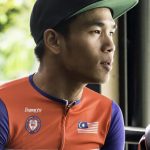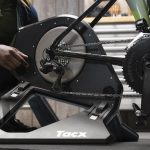The Rio Games may be over, but the Pocket Rocket Man’s cycling quest continues.
Rio 2016 is now history, but the Olympians returned to their home countries, carrying the future with them. That Terengganu-born small guy who competed in the Olympic velodrome? He’s back with Malaysia’s first track cycling medal.
Azizulhasni Awang tells us his story of fighting the good fight.

The pressure was on, having to deliver Malaysia’s first cycling medal. No, it’s not a me against the world kind of battle. It’s a battle against himself, which he never gave up on, only conquered, bringing home a rather heavy, absolutely priceless medal with him.
Coach John Beasley arranged a training camp for the team in Portugal, where he and Fatehah Mustapha got to focus on racing simulation.
“The whole team was there. Portugal is closer to Rio, so it shares the same altitude, humidity and food, among others.”
Most of his preparation was spent on his training base Melbourne leaving only four weeks dedicated in Portugal, before flying to Rio. There, he was able to fully concentrate on training. It came as no surprise that more than the wake up, train, eat, sleep routine, their team also studies racing strategies once home, alongside some psychology and team building sessions.
“The sessions we had were key to the race. Everyone was stressed out, even Coach John was.” So together, they tried to learn from their past racing experiences by looking into things they previously missed out on.
He added, “Sometimes it’s a bit kelam kabut (messy), as there’s a lot of planning taking place, although we don’t forget to have lots of fun.”
Reaching the top ain’t easy at all with tough discipline at play. Consider Olympic-bound athletes like Azizul a mythical example of self-control.

Talk about strategy, and Azizul was quick to tell us it never was just Plan A.
To maintain a leading position. That was plan A. “But situation changed, so I had to use our back-up plan.”
In the first round heat, he only finished fifth out of seven cyclists. “I didn’t get a very good position, so I had to really push myself at the repechage.”
The Olympic velodrome stood witness to his strength in the repechage opener. He did not disappoint, showing a strong ride. He led, lost the lead and regained it to win the heat, qualifying him for the second round.

“After the pull-off, all competitors went on full force. Czech Republic’s Kelemen squeezed me to the side, so I knew I could not stay at my position. I backed off a bit, looking for the right timing and position.”
While best sprinters can make good keirin riders, Azizul proves that it’s not always about speed. He knew his game well. He had to be tactically sharp and daring, as this kind of race sees frequent crashes with riders’ very close riding proximity to each other—his horror injury from the 2011 World Cup sets a perfect example.
After discerning the right opportunity, “I fully launched my sprint and won the top spot,” slipping past Canada’s Barrette, Holland’s Bos and Czech Republic’s Kelemen.
He shared with us that holding his position first behind the other riders was part of the plan. “I don’t have any space to launch my sprint, so I had to get back a bit, leaving about half a bike distance, and waited like 1.5 laps before I sprinted for the win.”
He further explained that some riders can do long sprints, while some are good with short bursts, depending on the rider’s ability. “We don’t pay a lot of attention to the timing, but the placing.”
We noticed how other riders charged ahead, blocking him and leaving him stuck at the back, but still he had that confident look on his face.
He smiled, “I knew I would win.”

One day was all it took to make history. It’s a whole day of competing from the first round heat to the repechage, second, then the final. There was not much waiting time, as he explained, “The second and final round only took about 1-1.5 hours. Right after the second round, I focused on the warm-up, taking some rest, and watching the race on my phone.”
“I was also listening to my favorite motivational song.” He beamed.
In between rounds, he and Coach John would discuss about the race, watch some footage and analyze a few identified racers. “We knew that Jason Kenny and another racer could jeopardize my gold medal mission.” They studied their capability and their racing strategy.
“It’s nothing intense, we just made sure we understood their game plan.” He added, “We didn’t change our plan too much given the limited amount of time on the race day itself, but we were able to predict.”
You’re wrong if you think that cycling races are all about who pedals the fastest. Tactics play a huge role in keirin. “It’s a tactical game that depends on your timing and positioning—also luck!”
He shared with us the action before he crossed the finish line. Following Jason Kenny on the last lap, he thought everything was going well within his expectations.
“The plan was to take over him around the final bend, but when the time came, the Poland rider came forward sprinting, blocking Kenny, who moved out, unintentionally blocking my launch.”
This brought his speed on hold, that when he tried a follow-up attempt, it was already too late as there was only 100m distance left in the race.
“I thought I won silver, but when the scoreboard showed the results, I actually won bronze.”
Azizul shared with us the surge of emotions he felt after. “I felt sad, I was going around the track for one to two laps, then I went to see my teammates and my coach.”
His inner dialogue went like this, “I should be happy as I ended up on the podium. After two Olympic games, I finally made it. I must enjoy this moment, while people around me are clapping and cheering my name.”
As he stood beside two cycling heavyweights, he realized great joy. “I was the smallest, the only Asian cyclist, standing on the podium of the biggest sporting game in the world.”




